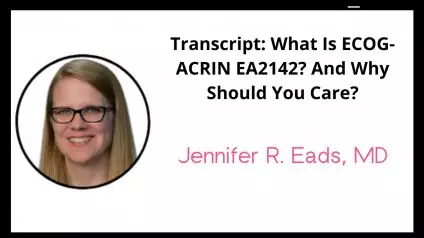
Â
Article: Transcript: Question – Please Tell Us About The EA 2142 Trial
Â
So, at ASCO 2022 this year I had the opportunity to present the results of the EA 2142 clinical trial this is a randomized phase two study of platinum and a etoposide versus temozolomide and Capecitabine in patients with advanced G3 non-small cell GastroenteropancreaticÂ
Â
📺 Click to Watch Video
🔊 Click for Audio Only
Â
neuroendocrine neoplasms including both great grade three neuroendocrine tumors and grade 3 neuroendocrine carcinomas so really the reason for this trial being done is that as you’re probably aware high grade neuroendocrine neoplasms are a relatively rare disease entity and there really has not been a prospective trial that’s been conducted to adequately evaluate the appropriate treatment regimens for this patient population historically high grade neuroendocrine carcinomas have been treated akin to small cell lung cancer because for a long time it was thought that they looked similar under the microscope at least but as we’re learning more and more we have realized that they’re not really the same as small cell lung cancer and there’s never been a prospective evaluation of the chemotherapy that we standardly use for this population platinum and the etoposide so um in an effort to both gain a better understanding for the role of platinum and a etoposide in high grade neuroendocrine carcinoma and also to evaluate other potentially promising regimens uh in this disease we did this randomized study of platinum and a etoposide versus temozolomide and capecitabine so temozolomide and Capecitabine is a regimen that’s thought to have activity in in more well-differentiated neuroendocrine tumors particularly of the pancreatic primary and of all the regimens that have been evaluated to date it seemed like that was the most appropriate for a randomization so um so this randomized trial was conducted with the primary objective of evaluating progression-free survival in patients receiving either of these regimens and secondarily we looked at response rate overall survival and toxicities we do also have some laboratory and imaging correlates planned so patients who were eligible for the trial included those who had a histologically confirmed unresectable or metastatic high-grade neuroendocrine carcinoma or grade 3 neuroendocrine tumor of gastrointestinal primary and who had not received any other prior therapy for their disease they were randomized to receive either temozolomide in Capecitabine so temozolomide I’m sorry Cape capecitabine being given twice a day for 14 days and then temozolomide for the last five days of those 14 days on a 28-day treatment cycle or platinum and a etoposide chemotherapy so it was physician discretion if they received cisplatin or carboplatin it was given for three days in a row along with a etoposide for three days in a row and this was on a 21 day cycle patients then underwent a CT evaluation or MRI every eight weeks to evaluate for response um in total we had planned to accrue 80 patients to the trial um and ended up accruing only 63 as there was an interim analysis conducted that um deemed the study to be futile and so it was closed early for futility in terms of patients who participated in the trial we had about um uh the majority of the patients were male although it was relatively balanced between the two groups and one sort of detail to really note in terms of the underlying pathology is that we did have a pretty good mix of pancreas versus non-pancreas primaries and then also poorly differentiated versus well-differentiated primaries um in terms of progression-free survival um which was our primary objective for the trial the study did not meet the primary endpoint of determining that temozolomide and Capecitabine was Superior to Platinum Etoposide however if we look at the actual numbers amongst all comers on the trial so including pancreas and non-pancreas primaries and well-differentiated and poorly differentiated patients we see that the progression-free survival was 3.45 months with temozolomide and Cape capecitabine and 5.36 months with Platinum Etoposide in terms of overall survival the temozolomide in Capecitabine was actually a little bit longer at 12.6 months versus 10.6 months with platinum and a etoposide in regard to response rate temozolomide and capecitabine showed a response rate of 19 versus platinum a etoposide where that was the response rate was 22 percent so overall the study did not meet its primary objective of demonstrating that platinum or I’m sorry that temozolomide and capecitabine was Superior to platinum in a etoposide however when you look at the curves they do seem to be relatively similar and the study was not otherwise designed to look at non-inferiority or to see if um if Platinum etoposide was Superior to temozolomide and Cape capecitabine so um the toxicity profile I had meant to mention was actually more favorable in the temozolomide in capecitabine containing arm um in the Platinum Etoposide arm we had more grade three events of fatigue and capecitabine so when you consider that the survival curves look relatively similar um even though statistically it didn’t meet the threshold for saying that temozolomide that capecitabine was Superior I think it’s a very reasonable option to also consider this as a Frontline therapy for this patient population particularly also because the toxicity was um was more favorable with temozolomide and Cape capecitabine so one you know caveat is that this trial did include both poorly differentiated and well-differentiated tumors so now we have been more astringent in terms of our trial design time and looking at the grade three tumors versus the grade three neuroendocrine carcinoma separately so I think future studies really should focus on looking specifically at those individual patient populations but the temozolomide then keep capecitabine is still um I think a reasonable alternative treatment option.

